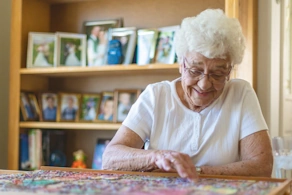Geriatric Syndromes: Common Conditions and How to Manage Them
Our Key Takeaway
Geriatric syndromes like frailty, falls, incontinence, and cognitive decline stem from multiple age-related factors and require a holistic approach to manage. Early checkups, lifestyle improvements, home safety changes, and strong caregiver support help seniors stay healthier, safer, and more independent as they age.
Aging impacts people physically and cognitively. Changes in these aspects can also cause health challenges in seniors. These challenges are termed geriatric syndromes.
These are not singular diseases but rather complex conditions seen in elderly people. One must know what these syndromes are to know how they are managed. This article tells you about them and how to manage them properly.
Life Assure Product Quiz
Take our 30 second quiz and discover which Life Assure medical alert device is the right fit for you or a loved ones.
Life Assure Product Quiz
Take our 30 second quiz and discover which Life Assure medical alert device is the right fit for you or a loved ones.
What Are Geriatric Syndromes?

Health conditions occurring due to various issues are called geriatric syndromes. A lot of factors are in play when these syndromes happen; these can be aging, chronic diseases, and environmental influences.
These are not at all similar to traditional diseases since they are not related to a single organ or a cause. Instead, a lot of systems are involved in these syndromes. When not checked, these can make one weaker and unhealthier over time.
Common Geriatric Syndromes And Their Causes
Let us have a look at the common syndromes and their causes:
Frailty
When one is growingly susceptible to stressors, they are said to be frail. This happens due to reduced physical reserves and weakened resilience.
You may lose weight without any reason, and your muscles will lose volume in case you get frail. This happens due to chronic inflammation and poor nutritional habits. Frail people are more likely to fall sick and suffer from falls.
However, it is not that frailty cannot be avoided. You can prevent it or even reverse it with intervention like resistance training.
Proper diet and medical management of underlying conditions are other ways to prevent this syndrome. Addressing frailty helps you improve your overall well-being as a senior person so you can handle daily challenges better.
Falls
Falls are the most common and serious syndromes. These cause injuries and fractures in older persons more than anything else.
Muscle weakness, impaired vision, and medication are usually the reasons behind losing balance. Environmental hazards like slippery floors and inadequate lighting also contribute to bad balance.
Preventing falls requires you to combine various strategies. This includes strength-building exercises and visions, along with a medication review.
Modifications in the home environment also go a long way. Regular fall-risk assessments should be made by healthcare providers so underlying issues can be detected early.
Incontinence
Urinary and fecal incontinence is often seen in older people. The ones that suffer from this face a reduced quality of life. The pelvic muscles weaken, or the bladder turns overactive in this case. The bladder issue is further a symptom of Parkinson’s disease or spinal injuries.
Several treatments exist for this issue. Pelvic flow exercises often help people in the long run. In other cases, medications and surgical interventions also prove effective.
Telling your physician or concerned doctor about this issue is important. This wa,y they can help you find the right solution for this syndrome.
Cognitive Decline
Cognitive decline can be anything from mild cognitive impairment (MCI) to dementia. It means one is slowly losing one’s memories and even one’s thinking skills.
Someone may also lose their decision-making abilities in this case. This syndrome is caused by poor cardiovascular health or simply the age of a person. Genetics and lifestyle choices may also be real reasons.
Cognitive decline, however, is not always reversible. One can still do some activities to slow its progression. One can engage in socializing, reading, and solving puzzles to feel better. Medications and therapies for enhancing brain function also help.
Managing Geriatric Syndromes
Here is how these syndromes are managed:
Holistic Approaches
Holistic care focuses on addressing the overall well-being of seniors. This includes the physical, emotional, and social factors. Physicians and therapists can work together to provide tailored care to individuals.
Holistic approaches ensure the well-being of the person rather than obsessing over treating the condition. This usually involves complementary therapies like massage or yoga, which better the person physically and mentally.
Medical Interventions
Timely medical intervention is needed for such syndromes. Here are some examples of this:
- ● Frailty can be treated with supplements like vitamin D and protein
- ● Medication is great for those with incontinence
- ● Cognitive decline is slowed down when a person receives timely therapies and medications
Early diagnosis using screening and regular health checkups is great so the conditions can be controlled before they worsen.
Lifestyle Modifications
Simple lifestyle changes go a long way in impacting these syndromes. These include:
- ● Regular physical activity for improving strength and balance
- ● Nutrition-rich diet with proteins and vitamins
- ● Consistent sleep schedule
Lifestyle modifications help seniors take better control over their health while also fostering independence.
Environmental Adjustments
Changing the living environment can help create a safe and comfortable space. Here are some things you can start with:
- ● Put grab bars in bathrooms to avoid falling
- ● Non-slip mats and adequate lighting should not be underestimated
- ● Keeping frequently used items within easy reach for lesser physical strain
These adjustments are simple but improve safety greatly for senior citizens.
The Role Of Caregivers And Support Systems

Caregivers can greatly help older adults who are going through these syndromes. They can be family members or professionals. They help the seniors with daily activities and medication management. Even the senior’s emotional well-being is looked after by the caregiver. Support systems include community groups and senior centers. They help reduce feelings of isolation so the seniors feel more socially engaged.
Preventive Strategies For Geriatric Syndromes
Here are some preventive strategies for syndromes:
Regular Checkups
Frequent medical checkups help find out and address the health issue before it can worsen. Routine screenings need to be done for your vision, hearing, and bone density, especially if you are getting older.
Promoting Healthy Aging
Balanced nutrition and physical exercises are good habits. Through these, you can prevent the onset of such syndromes. Puzzles and reading are great when you wish to keep the brain engaged as a part of mental stimulation.
Vaccinations And Preventive Screenings
One needs regular vaccination against flu, pneumonia, and shingles. These protect you from common infections. Preventive screening lets you know about the risk of chronic diseases before they worsen inside the body.
Conclusion
Geriatric syndromes are a great problem in the way of the health of older adults. If you know of their risk early on, you can employ the right management strategies. This article showed the comprehensive approach that one can adopt to address these syndromes and even prevent them.











 Get Help With The Push Of A Button
Get Help With The Push Of A Button














